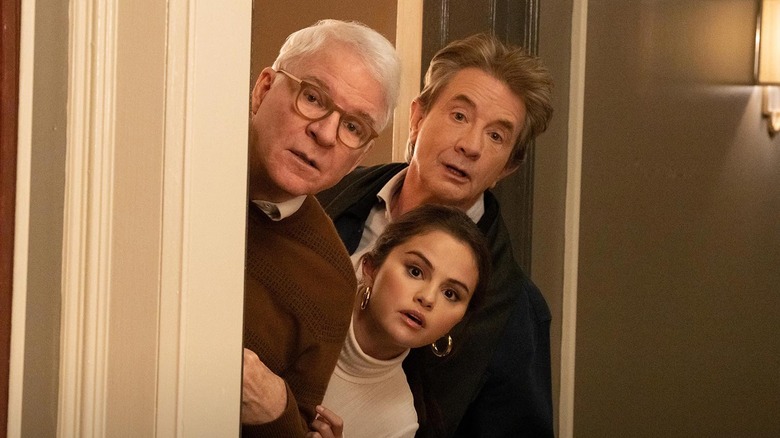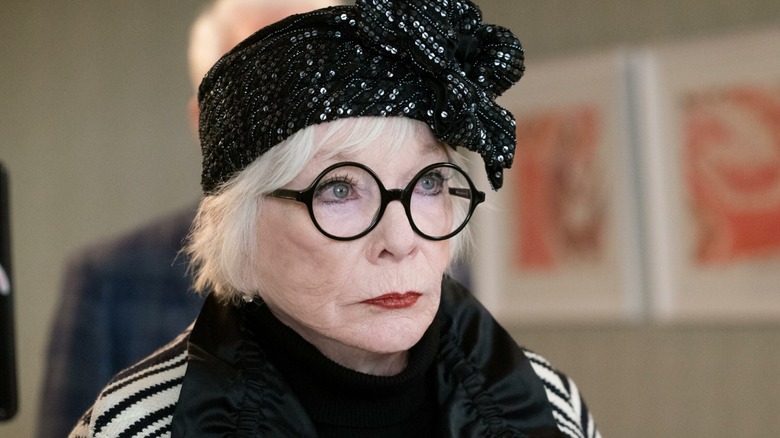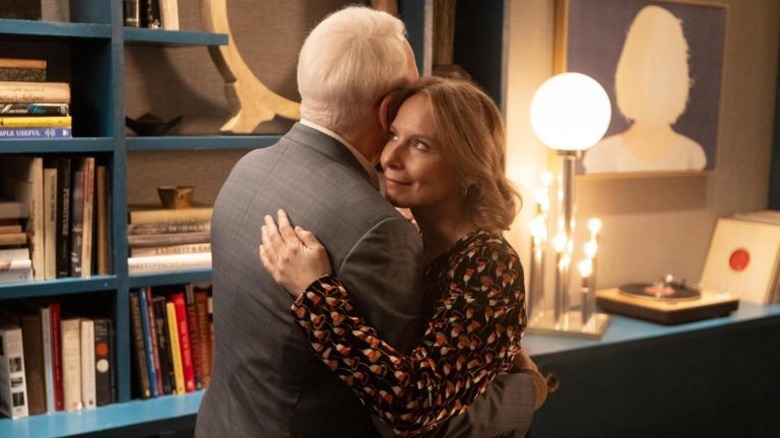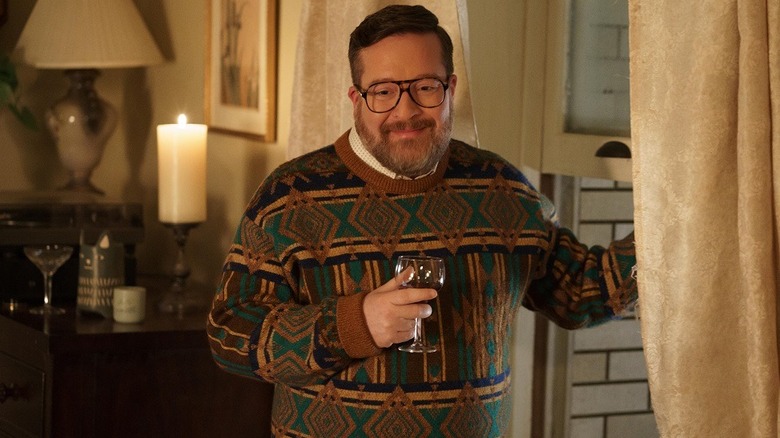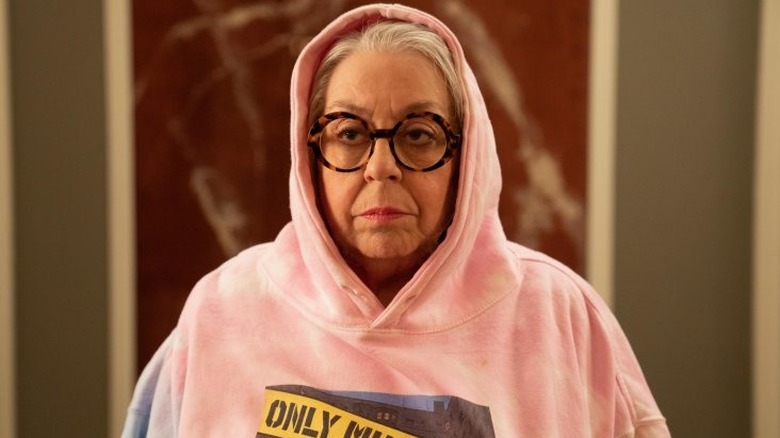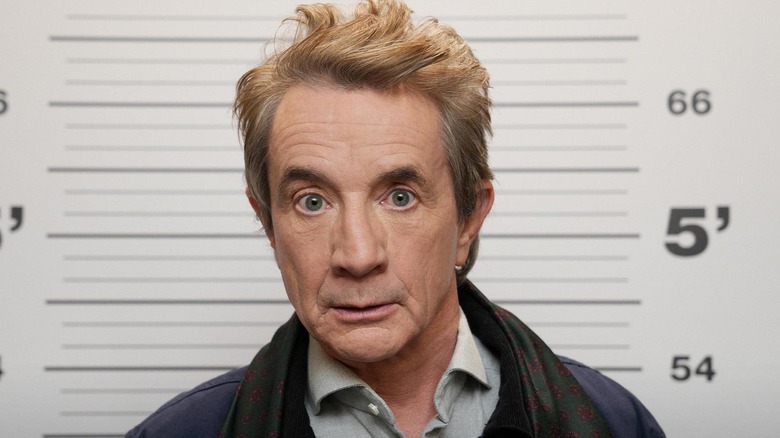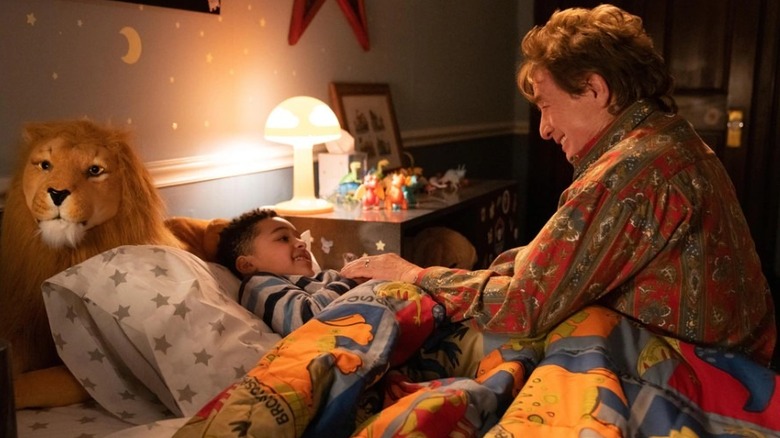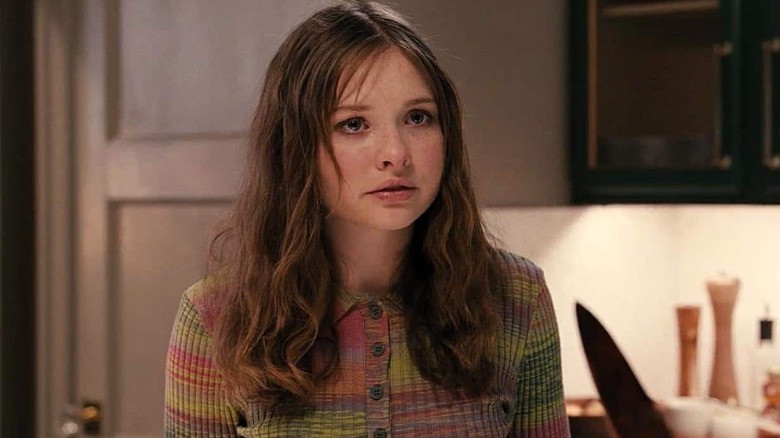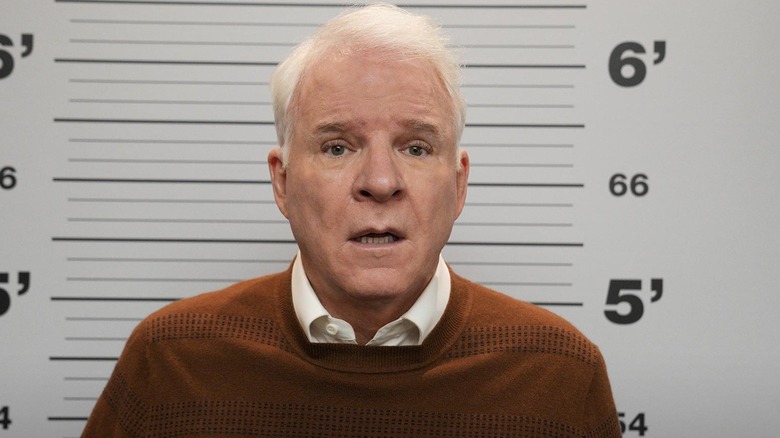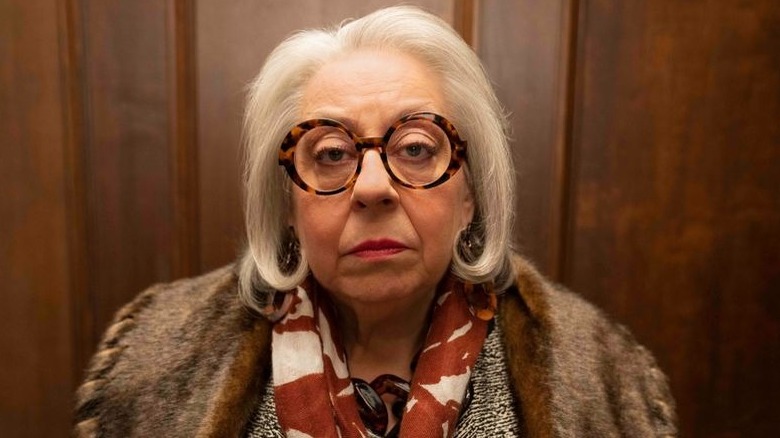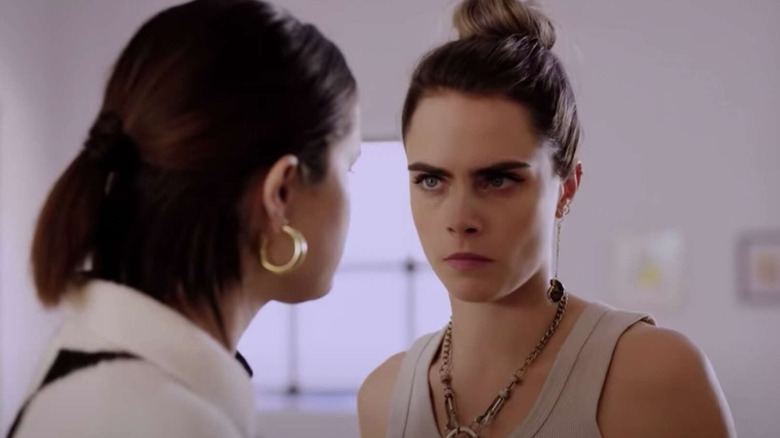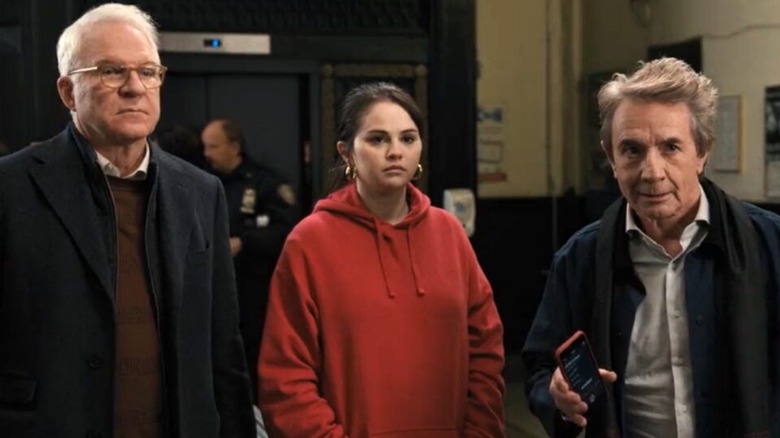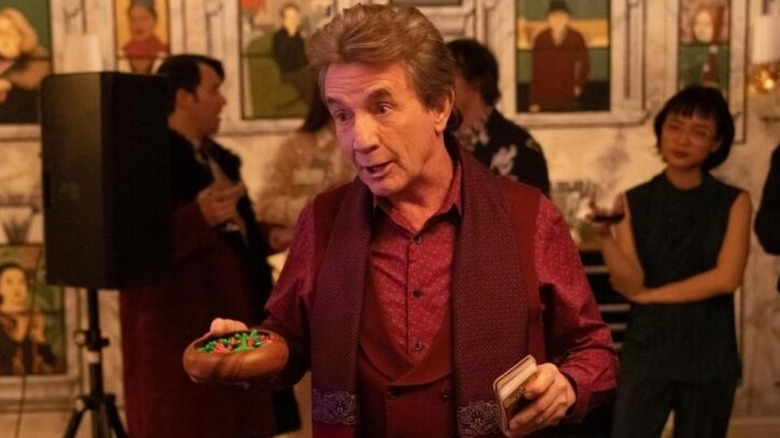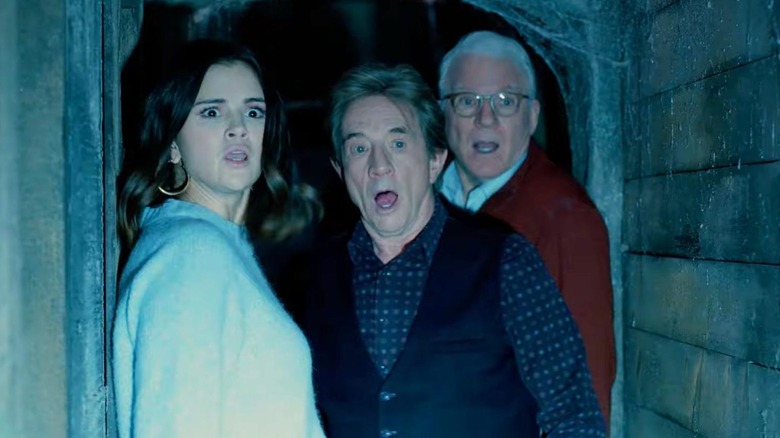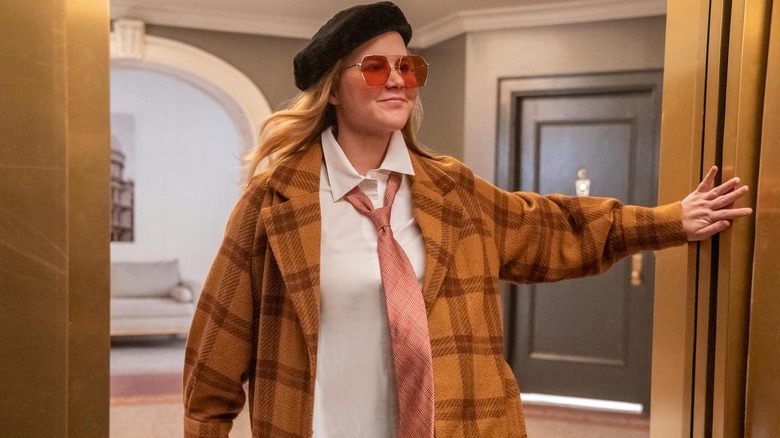The 7 Best And 7 Worst Moments In Only Murders In The Building Season 2
After solving Tim Kono's (Julian Cihi) and Zoe Cassidy's (Olivia Reis) murders — not to mention outing Teddy Diams' (Nathan Lane) criminal enterprise — the "Only Murders in the Building" sleuths finally got the chance to celebrate their investigative achievements. Of course, as soon as the crime-solving trio popped a bottle of champagne in Season 2, Mabel (Selena Gomez) discovers the body of the dreaded (or beloved, depending on who you ask) Arconia's building board president. Worse, whoever killed Bunny Folger (Jayne Houdyshell) sets up Mabel, Oliver (Martin Short), and Charles (Steve Martin) to take the fall.
As "Only Murders in the Building" nears its Season 2 finale, it's fair to say that this sophomore outing has been a vast improvement overall. That's not to say Season 1 failed in its comedy-mystery approach: there's a good reason why the second season received 17 Emmy nominations, whereas Season 1 snagged none. The cast's chemistry and comedic timing soar in its latest season, showcasing a tighter hand on who these characters are and who they desire to become. Buoyed by a less predictable storyline, Season 2 intricately winds its mystery around a light-hearted analysis of true-crime fans and dramatic beats that shines a light on how every character in this show is a complex individual — even Bunny Folger.
Let's dig into Season 2's highlights and the heartwrenching moments that made us love our indie-podcast crew even more, especially when they make big and cringeworthy mistakes.
Best: Rose Cooper's secret painting
I love when mysteries appear to be solved, but then another character reveals there's more beneath the surface to discover. Season 2's "Sparring Partners" accomplishes this feat with Rose Cooper's (Shirley MacLaine) secret painting storyline. When Rose admits she's only ever wanted Bunny's painting because it's her artwork, it didn't come off as too much of a surprise. The stylish chocolate martini drinker always felt too frivolous to be Bunny's mom. However, her reasoning for needing the original painting certainly took me by surprise. Underneath the oil painting of Charles' father having sex was a Rose Cooper-original portrait of Charles as a boy and his father. Rose then tells Charles that more than anything in this world, Mr. Savage (Ben Livingston) wanted to be a good father.
While Season 2 doesn't delve too far into Charles' relationship with his father, there's more than enough evidence to declare it complicated. We learn that Charles' dad was having multiple affairs. He frequently lied to his son, telling him he was off auditioning for acting roles — a fabrication that inadvertently inspired Charles to be an actor. Later in life, he struggled with an addiction to gambling and alcohol. There is no undoing the damage Charles' father did to his son's sense of trust, and it's clear this pains Charles still. However, this painting gives Charles a more hopeful reminder of the good times between them.
If you or anyone you know is struggling with addiction issues, help is available. Visit the Substance Abuse and Mental Health Services Administration website or contact SAMHSA's National Helpline at 1-800-662-HELP (4357).
Worst: Charles is still (sort of) dating Jan
To its credit, "Only Murders in the Building" Season 2 doesn't shy away from exploring the emotional fallout of Chuck and Jan's (Amy Ryan) relationship. Yes, Jan is behind bars, but there are still a lot of feelings for Charles to work through around losing an authentic connection to a murderous ex. While Oliver and Mabel gently poke fun at Charles' questionable dating choices, it's clear that Jan fractured Charles' trust in his judgment. After learning more about Charles' unreliable and manipulative father, Jan's betrayal hits harder.
When I saw Charles still dating an imprisoned Jan in Season 2, all I could say was, "Oh, buddy..." However, Charles' decision to keep in touch with Jan only heightens an integral truth about this character. Beneath his seemingly-arrogant and neurotic Brazzos surface, Charles is a lonely man, desiring a grounded, romantic partner. Returning to Jan once more was necessary for Charles to realize what he wants in life and accept that this is the kind of person he does not need. Here's hoping "Only Murders in the Building" Season 3 shows Charles jumping back into a dating world full of crossword puzzles and post-sex bagels. Considering that "Only Murders in the Building" might be Steve Martin's last role, it'd be lovely to see him stretch his rom-com skills one final time (as he did so well in "Roxanne").
Best: Howard finds a date
"Only Murders in the Building" understands the power behind giving a show's minor characters a fair mixture of one-liners and standout moments. Not only does it make the world of the Arconia feel lived-in, but it also opens up so many delightful story opportunities to revisit down the road. In Season 1, Howard's (Michael Cyril Creighton) fixation on his now-deceased cat Evelyn was a long-running gag. Although the cat ends up helping the podcasting trio solve Tim Kono's death, Howard's shut-in persona is used more as comedic relief. We don't know what his job is, and the awkward Howard has no non-cat interests.
But then Season 2 gifted Howard (and us) with an "Only Murders in the Building" blackout episode that shows the librarian's 30(ish), flirty, and thriving side. "Hello Darkness" gives Howard a B-storyline, following his quest to ask a cute new neighbor for a date. Howard rolls up the sleeves of his token sweater-and-collared-shirt combo and, despite thinking he will vomit or weep, asks Jonathan (Jason Veasey) to join him for some wine by candlelight. The two then discover a mutual love of singing, as Jonathan is a Broadway actor starring in "The Lion King." After Howard admits he's a yodeler who is afraid to sing alone, Jonathan encourages him to sing with him, leading the two to fill the Arconia with a yodeling rendition of Simon & Garfunkel's "The Sound of Silence." Take a bow, Howard. We're proud of you!
Worst: Never partying with Bunny Folger
Unless you can see the future, there's no way to know which seemingly-harmless life choices you'll later regret. Unfortunately, Mabel, Oliver, and Charles learn this the hard way. After half-heartedly inviting Bunny to hang with them and drink champagne, they're shocked when she shows up at their doorstep. As they watch Bunny through the peephole, they loudly whisper about how awkward it'd be, causing Bunny to weep. She goes back to her apartment and is then tragically killed. Although the podcasting trio didn't murder her, they could have prevented it. All it would have taken was to let down their guard and be kind.
The worst part about all this is the audience can tell how giddy Bunny is that she received a gift — an "Only Murders in the Building" sweatshirt — from her tenants. She wants to be involved with others, but it's hard to do that when you're their landlord. Despite the crew assuming that Bunny is a cruel b****, we later learn in the series that she tirelessly worked a thankless job and that the Arconia was the love of her life. It's a shame they'll never see Bunny's lighter side and that such casual cruelty made up her last living moments. I'm sure Bunny would have some badass stories to tell. But, who knows? As "Only Murders in the Building" co-creator and showrunner John Hoffman once told Jayne Houdyshell, "Don't worry, there are always flashbacks."
Best: Oliver, the babysitter
For as much as "Only Murders in the Building" relies on showcasing Oliver's sprightly nature, Season 2 effectively spends more time digging into how he's a thoughtful parent. Season 1 showed viewers an Oliver whose obsession with gaining relevance and fame jeopardizes his relationship with his son, Will (Ryan Broussard). When we first meet Oliver, he's struggling financially and hasn't had a successful project in years. Desperate times lead Oliver to be the most selfish version of himself. But after he finds recognition with his podcast, and is a part of a high-profile murder case. Oliver shows us (and Will) a gentler side.
One of the best examples of Oliver's tender side comes during his "A Chorus Line" routine. Oliver volunteers to help Detective Williams' (Da'Vine Joy Randolph) gassy baby with a musical dance number, an idea which repels her — which is hysterical since Randolph is also a Tony-nominated Broadway star. However, she gives him a shot, and Oliver play-dances with the baby like he's a little can-can dancer until he toots. Watching a Tony Award-winning Broadway star teach a baby a dance routine is so delightful that words can't do the sweet scene justice. The only thing that beats this moment are the words Oliver says to Williams: "You'll do anything if you think it'll help your kid." Despite his self-centered tendencies, Oliver deeply cares about Will and being a good parent. It's nice to see his parenting skills take center stage.
Worst: Will's real father reveal
Someone doesn't need to be genetically related to a child to be a good parent to them. In this light, the series' choice to show Oliver as a considerate parent while later revealing he's not Will's biological father is extremely powerful. My biological father never raised me, so I appreciate the importance of representing a loving but not genetically related father on-screen. Explaining what it feels like to be adopted is tricky because, in my experience, people perceive it to be tragic. In truth, there's plenty of joy, too, and enthusiastically expressing that is healing for fellow adoptees who wrestle with feelings of loss. Yes, I will never know my bio-dad, but my father poured his heart into the role as much as Oliver does.
Still, I don't like how the show, and Oliver, handle the reveal. Narratively, we probably didn't need this surprise unless it'll tie into future Teddy Dimas drama schemes. Watching Oliver repair his relationship with his son and grandson is a fruitful enough storyline for Season 2. Additionally, keeping this revealed secret from Will takes away the emotional resonance of what the show accomplished by showing a version of the adoptee's experience on-screen. True, Oliver raised his son without knowing this. Still, it would have been nice to see Oliver reveal this to Will and watch the two communicate around a taboo topic.
Best: Brazzos' singalong with his step-daughter Lucy
In "Here's Looking at You..." a young Lucy (Francesca Rain) is responsible for gifting "Only Murders in the Building" fans with Charles-Haden Savage's endearing performance of "Angel in Flip Flops." During a flashback, we see Charles serenading Lucy in the kitchen back when she (and likely Emma) still lived with him. His then-hit (but soon forgotten) single feels like a John Mellencamp-like approach to be vaguely political with saccharine '80s-era pop vibes. This musical-comedy beat works in favor of Charles' character; of course he'd try to transition his "Brazzos" career into singing in 1989 and flop.
On a deeper level, this scene adds more layers to Charles' present-day relationship with Lucy (Zoe Colletti). Flashbacks are tricky but work best, like in this case, when it feels like someone's memories would wander back to that time organically. After Lucy reappears in his life, of course, he's going to reflect on the relationship they once had. As Charles texts his way towards regaining that closeness, this reflection deepens our understanding of what Charles was like as a parent. Self-involved? Sure! But he committed to the role with his whole heart.
Worst: Charles' father's tragic backstory
Season 1 of "Only Murders in the Building" hinted that Charles didn't have a great relationship with his father. In Season 2, we gain a deeper insight into how Charles' father misled him. Narratively, this backstory element works well and is only on this list for how heartwrenching it all is. Charles choosing an acting career because it was something he thought he shared with his father — only to learn that, too, was a lie — is heartbreaking. Yes, Charles can be full of self-importance and takes his "Brazzos" career too seriously. However, these flaws connect to his feelings around abandonment and insatiable need for validation. Having a parent who doesn't see your worth is a very hard wound to heal.
Knowing this is something Charles struggled with in life adds pathos to the simultaneously arrogant and neurotic character. While Charles learns more about who his father was from Rose Cooper, you can see the wheels turning in his head. Lucy recently reentered his life at a pivotal time. Charles can't change who his father was, but he can use those experiences to evolve into a reliable father figure for Lucy.
Best: Bunny Folger's standalone episode
Finally, Bunny Folger takes the stage! When you have a tour-de-force like Tony winner Jayne Houdyshell in a series, there better be some meaty material to bite into, and thankfully, "The Last Day of Bunny Folger" is exactly that. Season 2, Episode 3 of "Only Murders in the Building" takes a bold move in dedicating an entire episode to exploring a day in Bunny's life. However, it stands out now as one of the series' best episodes to date.
Previously, we only saw Bunny from the perspective of her tenants, painting her as stoic, hard to please, and cold. But in her standalone episode, we see her point of view in and outside of the Arconia. Embodying the Upper West Side aesthetic of old New York, Bunny shows love to her friends with cuss words and speed-walking. While Oliver sees her as stingy, she's a generous tipper. Bunny takes her job to heart, taking the time to learn every detail of her tenants' and workers' lives.
Mabel, Oliver, and Charles weren't kind to Bunny. All it took for her to offer them the "good champagne" was acknowledgment. All Bunny wanted was for people to appreciate her life's work. Or hear how worried she is about the Arconia's future in a city struggling to preserve its history due to luxury real estate deals. Her reluctance to retire works as a moving metaphor for the real-life preservationists of New York.
Worst: Alice uses Mabel's trauma for performance art
When Cara Delevingne's Alice popped up in Mabel's DMs shortly after #BloodyMabel went viral, I figured this eventual romance would take a dark turn. While I'm still not 100% convinced that Alice doesn't have a connection to Bunny's murder, I was shocked at how she betrayed Mabel. Merging real-life heartbreak into artwork is common (*insert any Taylor Swift song here*). But it becomes disturbing when someone takes another person's experience and uses it as their muse. When a stolen moment is also a traumatic experience someone entrusted you with, this choice becomes irredeemable.
Thankfully, when Mabel found out that Alice took her experience of witnessing Bunny's death and heartlessly turned it into performance art, she dumped her. That was never Alice's story to tell, and Mabel points this out to her. Sadly, Mabel was starting to experience joy in dating someone who seemed to care about her, her artwork, and her future. Mabel didn't need to have a run-in with another deceptive person, but at least, this time, she walked away.
Best: Mabel's blackouts explained
Sometimes "Only Murders in the Building" relies too heavily on writing Mabel as a sardonic character, using her as a way to take Charles and Oliver down a peg or two with deadpan one-liners. Shrouded in mystery, there's a lot we still don't know yet about Mabel. To be fair to Mabel, classic crime-solving characters like Raymond Chandler's Philip Marlowe often conceal key character traits. They've seen enough of the bleakness in the world to be reluctant to share much of themselves.
However, "Flipping the Pieces" gives Selena Gomez material that allows her to show more range and add depth to her ominous character. Additionally, it finds a fitting way to discuss Mabel's blackouts. In this episode, we learn she disassociates whenever things get too painful. Over time, this has created some memory gaps for Mabel. In Mabel's words, she flips over the memory like a puzzle piece so the things that are hard to see won't be. Credit is due to the writers' room as they handled a complicated coping method with empathy.
If you or someone you know needs help with mental health, please contact the Crisis Text Line by texting HOME to 741741, call the National Alliance on Mental Illness helpline at 1-800-950-NAMI (6264), or visit the National Institute of Mental Health website.
Worst: Oliver ruins Alice's party
"Only Murders in the Building" spent so much time building up Oliver's ability to read a room that we knew it had to end poorly. Of course, the one time his trick fails is around Mabel's new girlfriend. While Oliver's party trick doesn't pan out how he hoped, he inadvertently leads Alice into confessing some of her lies. Despite how cringeworthy it is (I still feel vicariously embarrassed for Oliver), he's the first person to direct Mabel's attention to Alice's inconsistent nature. Also, he's not wrong. While Mabel won't ever know this, the viewer sees that Alice did have the killer card all along. She hid it earlier in the episode, implying she picked up someone else's card mid-game. Digging a bit deeper, it seems possible that Alice sensed Oliver's dislike of her and, in response, decided to humiliate him.
Story-wise, this beat works, but I enjoyed the show leaning into Oliver's people-reading talents more. He's often the butt of a joke — a failing theater director, a baby-food-like obsession with dips, easily tricked by flattery — that it was nice to see that there is more to Oliver. While that's still true, I wish Mabel could have seen it. Hopefully, Season 2's finale gifts him with a moment to shine as an investigator.
Best: Arconia's secret tunnel system reveal
Of all the mystery tropes brought into the series thus far, I love the hidden tunnel system of the Arconia the most. The secret passageways give the series more visual space to explore and design, rewriting all we think we know about Arconia's layout. Intriguingly, it raises compelling storytelling questions like: if you can travel unseen in the Arconia, what would you do? I'm curious how Arconia's secret passageways connect to Bunny's murder, as it raises the potential that anyone (not just a resident or worker at the Arconia) could have snuck inside to kill her. What else (or who else) lurks inside the walls of the Arconia?
Season 2 also marked the first time the series traveled back in time, showing us an Arconia of decades past. These passages can interweave more of the Arconia's past mysteries into the series. In real life, hidden passageways were used in old buildings for several purposes, like a way for staff members to discreetly and quickly travel, monitoring the safety of VIP guests like the Waldorf Astoria did, protecting endangered humans, and for secret meetings. All of the above gives the show writers plenty of material for future episodes to explore.
Worst: Amy Schumer's cameo
Despite the delightful cameos we've seen so far in "Only Murders in the Building," Amy Schumer portraying herself is a low point for the series. Tonally, her role doesn't fit into how the show tackles the wackiness of self-serious people. She doesn't have the melancholy of Charles or the (deep down) generous nature of Oliver. Her bit feels like a one-note character who is not bold enough to lean into farce or sincerity. The over-the-top nature of her as a self-aware and demanding force harkens back to the verve Catherine O'Hara gave Moira Rose. Honestly, if the show wanted to have a famous celebrity in its mix to flatter Oliver, it would have been amazing to see O'Hara bring her comedy to the Arconia.
After facing backlash from her insensitive Alec Baldwin joke earlier in 2022, it was a smart move to play a parody of herself. However, she doesn't lean enough into honestly making fun of her flaws and comedic missteps. If she had done that more on screen, this role could have been a positive step forward in her controversial career; showing maybe not evolution, but genuine ownership into who she is as a comedian and who she is becoming.
